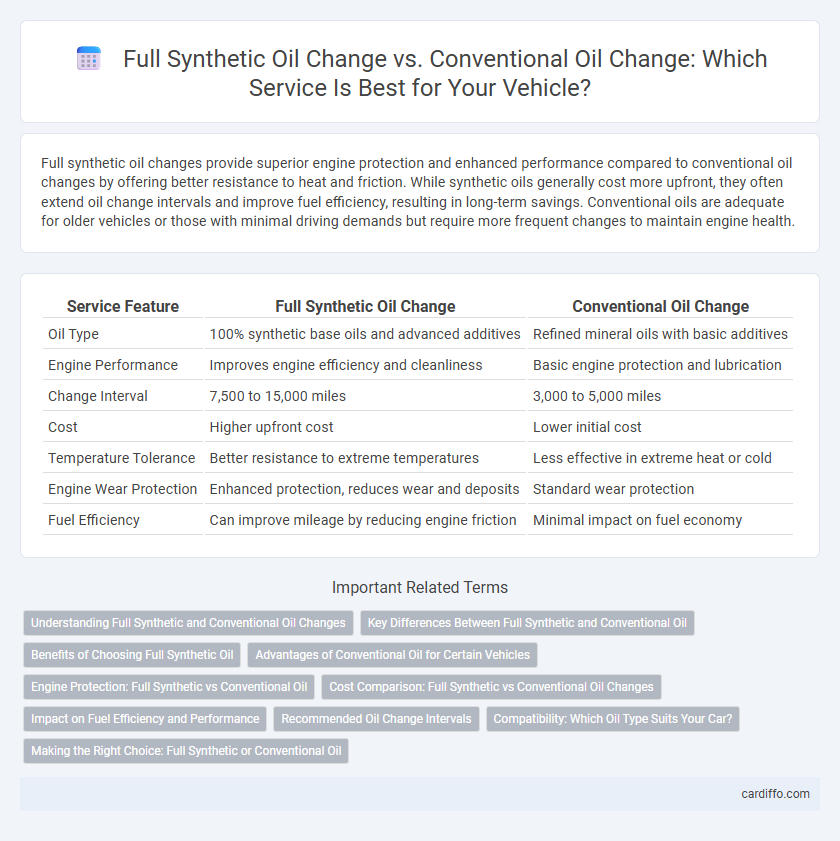Full synthetic oil changes provide superior engine protection and enhanced performance compared to conventional oil changes by offering better resistance to heat and friction. While synthetic oils generally cost more upfront, they often extend oil change intervals and improve fuel efficiency, resulting in long-term savings. Conventional oils are adequate for older vehicles or those with minimal driving demands but require more frequent changes to maintain engine health.
Table of Comparison
| Service Feature | Full Synthetic Oil Change | Conventional Oil Change |
|---|---|---|
| Oil Type | 100% synthetic base oils and advanced additives | Refined mineral oils with basic additives |
| Engine Performance | Improves engine efficiency and cleanliness | Basic engine protection and lubrication |
| Change Interval | 7,500 to 15,000 miles | 3,000 to 5,000 miles |
| Cost | Higher upfront cost | Lower initial cost |
| Temperature Tolerance | Better resistance to extreme temperatures | Less effective in extreme heat or cold |
| Engine Wear Protection | Enhanced protection, reduces wear and deposits | Standard wear protection |
| Fuel Efficiency | Can improve mileage by reducing engine friction | Minimal impact on fuel economy |
Understanding Full Synthetic and Conventional Oil Changes
Full synthetic oil changes use advanced chemical formulations designed to provide superior engine protection by reducing wear, resisting oxidation, and maintaining viscosity in extreme temperatures. Conventional oil changes utilize refined crude oil with basic additives that offer adequate lubrication but may break down faster under intense driving conditions. Understanding the differences helps vehicle owners select the appropriate oil type based on driving habits, engine requirements, and long-term maintenance goals.
Key Differences Between Full Synthetic and Conventional Oil
Full synthetic oil offers superior engine protection by maintaining viscosity and reducing sludge build-up under extreme temperatures, unlike conventional oil which breaks down faster. It provides enhanced performance and longer oil change intervals, often lasting up to 10,000 miles compared to 3,000 to 5,000 miles for conventional oil. The advanced chemical composition of full synthetic oil effectively reduces engine wear and improves fuel efficiency, making it more suitable for high-performance and modern engines.
Benefits of Choosing Full Synthetic Oil
Full synthetic oil offers superior engine protection by reducing wear and tear through advanced molecular uniformity and enhanced thermal stability. It maintains optimal viscosity under extreme temperatures, improving fuel efficiency and extending engine life compared to conventional oil. Regular use of full synthetic oil can also reduce sludge buildup, resulting in fewer maintenance issues and better overall engine performance.
Advantages of Conventional Oil for Certain Vehicles
Conventional oil offers advantages for older or less complex engines by providing adequate lubrication at a lower cost compared to full synthetic oil. It contains additives that help protect engines operating under normal driving conditions without the need for high-performance properties. Using conventional oil can be beneficial for vehicles with simpler engine designs that do not require the enhanced stability and thermal resistance found in full synthetic oil.
Engine Protection: Full Synthetic vs Conventional Oil
Full synthetic oil provides superior engine protection by maintaining viscosity and performance under extreme temperatures and high stress, reducing wear and sludge buildup more effectively than conventional oil. Conventional oil offers basic lubrication but breaks down faster, leading to increased engine deposits and potential damage over time. Choosing full synthetic oil enhances engine longevity and efficiency by optimizing lubrication and minimizing contaminants.
Cost Comparison: Full Synthetic vs Conventional Oil Changes
Full synthetic oil changes generally cost between $70 and $100, whereas conventional oil changes typically range from $30 to $50. Although synthetic oils are more expensive upfront, they provide longer intervals between changes, often lasting up to 10,000 miles compared to 3,000 to 5,000 miles for conventional oils. Over time, the extended performance of full synthetic oil can offset the higher initial cost by reducing the frequency of oil changes and lowering engine wear.
Impact on Fuel Efficiency and Performance
Full synthetic oil change significantly improves fuel efficiency by reducing engine friction and enhancing lubrication, which leads to smoother engine operation and better mileage. In contrast, conventional oil may cause higher engine drag due to its lower resistance to heat and oxidation, slightly decreasing fuel economy. Performance-wise, synthetic oils maintain viscosity under extreme conditions, ensuring optimal engine power and protection, while conventional oils degrade faster, potentially reducing engine responsiveness and longevity.
Recommended Oil Change Intervals
Full synthetic oil change intervals typically range from 7,500 to 15,000 miles, offering extended engine protection and improved performance compared to conventional oil changes, which usually require replacement every 3,000 to 5,000 miles. Vehicle manufacturers often specify synthetic oil change intervals based on driving conditions and engine requirements, promoting longer service life and better fuel efficiency. Adhering to recommended oil change intervals ensures optimal engine health, prevents wear, and maintains warranty compliance.
Compatibility: Which Oil Type Suits Your Car?
Full synthetic oil offers superior compatibility with modern engines, especially those with turbochargers or direct injection systems, due to its advanced formulation and higher resistance to breakdown under extreme conditions. Conventional oil suits older models or vehicles with less demanding engine designs, providing adequate protection at a lower cost but may lack the performance benefits needed for high-tech engines. Always consult your vehicle's owner manual or a trusted mechanic to determine the best oil type for your car's specific requirements and driving habits.
Making the Right Choice: Full Synthetic or Conventional Oil
Choosing between full synthetic and conventional oil changes hinges on factors like engine type, driving conditions, and vehicle manufacturer recommendations. Full synthetic oil offers superior performance by reducing engine wear, enhancing fuel efficiency, and withstanding extreme temperatures, making it ideal for high-performance or newer vehicles. Conventional oil is a cost-effective option for older or low-mileage engines with moderate driving demands, but may require more frequent changes to maintain optimal engine health.
Full Synthetic Oil Change vs Conventional Oil Change Infographic

 cardiffo.com
cardiffo.com